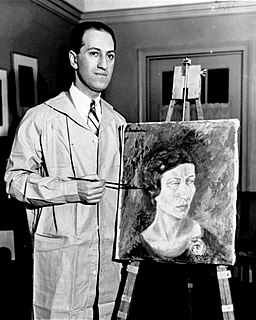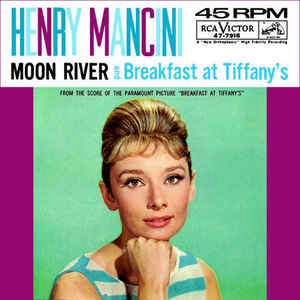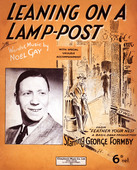
George Gershwin was an American composer, pianist and painter whose compositions spanned both popular and classical genres. Among his best-known works are the orchestral compositions Rhapsody in Blue (1924) and An American in Paris (1928), the songs "Swanee" (1919) and "Fascinating Rhythm" (1924), the jazz standard "I Got Rhythm" (1930), and the opera Porgy and Bess (1935), which gave birth to the hit "Summertime".

Hiram "Hank" Williams was an American singer-songwriter and musician. Regarded as one of the most significant and influential American singers and songwriters of the 20th century, Williams recorded 35 singles that reached the Top 10 of the Billboard Country & Western Best Sellers chart, including 11 that ranked number one.

George Formby, was an English actor, singer-songwriter and comedian who became known to a worldwide audience through his films of the 1930s and 1940s. On stage, screen and record he sang light, comical songs, usually playing the ukulele or banjolele, and became the UK's highest-paid entertainer.

"Moon River" is a song composed by Henry Mancini with lyrics by Johnny Mercer. It was originally performed by Audrey Hepburn in the 1961 movie Breakfast at Tiffany's, winning an Academy Award for Best Original Song. The song also won the 1962 Grammy Awards for Record of the Year and Song of the Year.
Herbert A. Magidson was an American popular lyricist. His work was used in over 23 films and four Broadway revues. He won the first Academy Award for Best Original Song in 1934.
"They Can't Take That Away from Me" is a 1937 popular song with music by George Gershwin and lyrics by Ira Gershwin. It was introduced by Fred Astaire in the 1937 film Shall We Dance and gained huge success.

Anthony Martin Kimmins, OBE was an English director, playwright, screenwriter, producer and actor.
Kelville Ernest Irving was an English music director, conductor and composer, primarily remembered as a theatre musician in London between the wars, and for his key contributions to British film music as music director at Ealing Studios from the 1930s to the 1950s.

"Live and Let Die" is the theme song of the 1973 James Bond film of the same name, performed by the British–American rock band Wings. Written by English musician Paul McCartney and his wife Linda McCartney, it reunited McCartney with former Beatles producer George Martin, who produced the song and arranged the orchestra. McCartney was contacted to write the song by the film's producers Harry Saltzman and Albert R. Broccoli before the screenplay was finished. Wings recorded "Live and Let Die" during the sessions for Red Rose Speedway in October 1972 at AIR Studios. It was also the first rock song to open a Bond film. Another version by B. J. Arnau also appears in the film.

George Formby was an English comedian and singer in musical theatre, known as one of the greatest music hall performers of the early 20th century. His comedy played upon Lancashire stereotypes, and he was popular around Britain. His nickname, "The Wigan Nightingale", was coined because of the way he would use his bronchial cough as a comedic device in his act.
"Don't Blame Me" is a popular song with music by Jimmy McHugh and lyrics by Dorothy Fields. The song was part of the 1932 show Clowns in Clover and was published in 1933. Popular versions that year were recorded by: Ethel Waters, Guy Lombardo, and Charles Agnew.

Hold On! by Herman's Hermits is the band's third album and was released in the United Kingdom by EMI/Columbia

"Avalon" is a 1920 popular song written by Al Jolson, Buddy DeSylva and Vincent Rose referencing Avalon, California. It was introduced by Jolson and interpolated in the musicals Sinbad and Bombo. Jolson's recording rose to number two on the charts in 1921. The song was possibly written by Rose, but Jolson's popularity as a performer allowed him to claim composer co-credit. Originally, only Rose and Jolson were credited, and DeSylva's name was added later.

Feather Your Nest is a 1937 British musical comedy film directed by William Beaudine and starring George Formby, Polly Ward and Enid Stamp-Taylor.
Eddie Latta was the songwriting name of Bruce Alfred Williams, a Liverpool undertaker who wrote songs for the Lancashire film actor and music hall artist George Formby, among others.

The English comic, singer and actor George Formby performed in many mediums of light entertainment, including film, radio and theatre. His career spanned from 1915 until December 1960. During that time he became synonymous with playing "a shy, innocent, gauche, accident-prone Lancashire lad".
This is a summary of 1937 in music in the United Kingdom.
"Fanlight Fanny" is a song written in 1935 by George Formby, Harry Gifford and Fred E. Cliffe, and recorded by Formby in May that year. Another notable version was released in 1962 by Clinton Ford.
Gifford Folkard, known professionally as Harry Gifford, was an English songwriter. He worked from the 1900s but is best known for his work in the 1930s co-writing songs with Fred E. Cliffe for entertainer George Formby.










